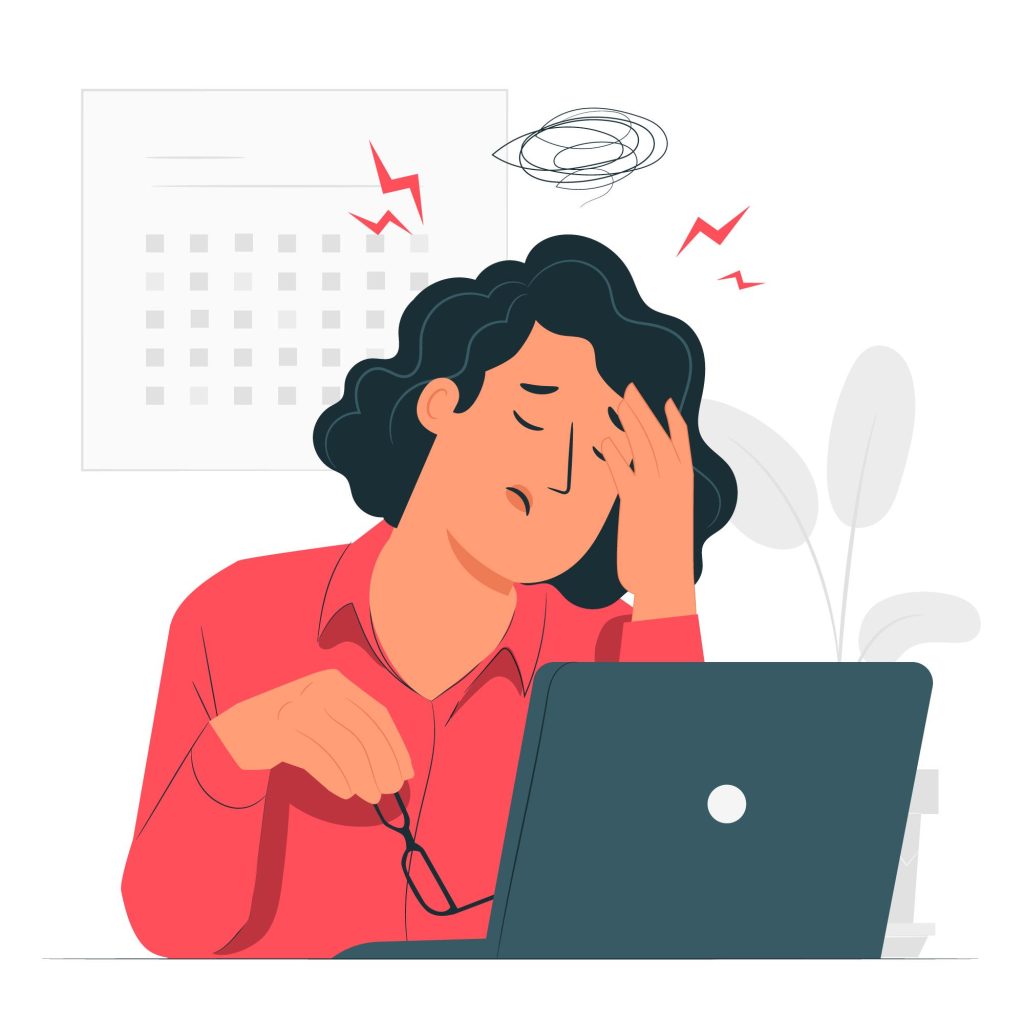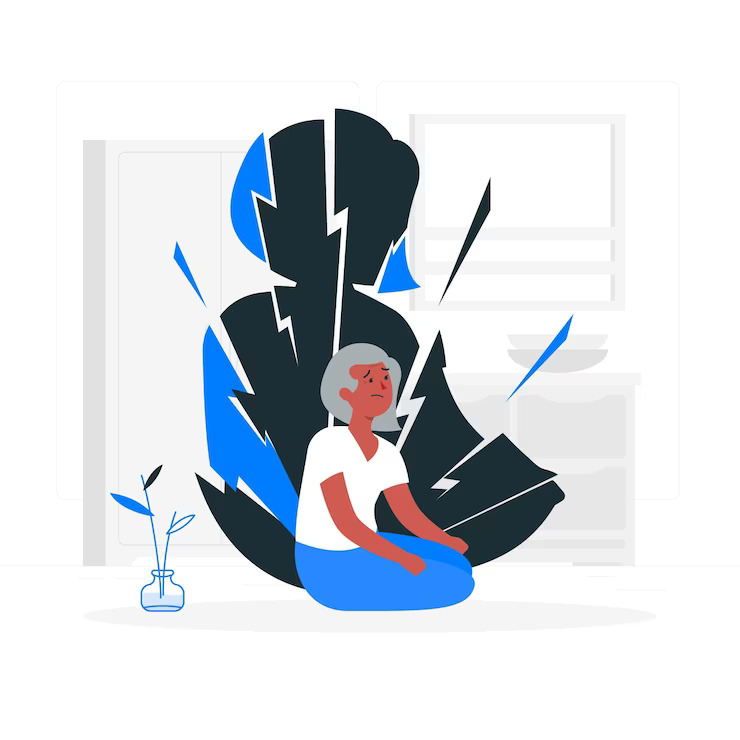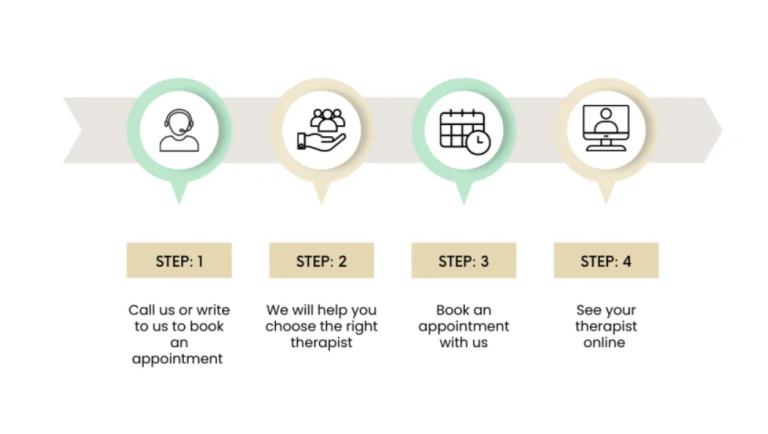
Therapy For Stress Management
Feeling stressed regularly makes it difficult for you to seek the right solutions for resolving what is causing distress within you. If you are chronically stressed and it is becoming hard to function with it, seeing a psychologist can be very helpful.
35000
Sessions
22+
YEARS EXPERIENCE
500000+
LIVES IMPACTED
Therapy For Stress Management: Process & Benefits
Therapy or Counselling for stress management can help on several fronts. It can help you regulate your nervous system, identify the causes and triggers and help you explore thought and habit patterns that are repeatedly keeping you stressed.
It can help you learn newer and healthier ways to cope with the existing stressful situations.
Your therapist may use various therapeutic approaches. These may range from gentle supportive approaches, to somatic approaches and even radically questioning long-standing patterns that are leading to this tendency to build stress. Your therapist may also help explore any life-situations that are responsible for stress and help you with methods to deal with them.
Here are some ways how therapy can enrich and improve your stress levels and overall mental well-being:
- Get solutions to reduce stress which can be applied to various settings, like work, school, family, or relationships
- Gain valuable insights into the root cause of your stress and what is keeping you in an endless, tiring stress cycle
- Have a supportive, safe, and validating space to work on your stress
- Attain freedom from the discomfort of chronic stress and overwhelm
- Feel more more comfortable, confident, and in control of your life.
Therapy is not a quick-fix approach. It is a gradual process, structured to look within and understand how your beliefs and patterns contribute to your stress.
In therapy, you collaboratively work with your therapist to create a plan. This stress management plan is designed keeping in mind your main concern, your history, and your unique preferences. This way, your therapist can guide you in a way that serves you best.
During therapy, your therapist will use various approaches to address the root cause of your stress.
Sometimes, they can look into certain tendencies, beliefs, and thought patterns, like:
- Setting extremely high and unrealistic expectations from yourself
- Negative self-talk (like, “I am not good enough,” “I am incapable”)
- Being highly perfectionistic
- Expecting large outcomes in a short span of time
- Overthinking about the past or the future
Therapists can also look into stress that could emerge from painful, overwhelming childhood experiences, or trauma. Most therapists use multiple approaches to look into your specific concerns, so that you receive the right plan to address them. Therefore, opting for therapy gives you an opportunity to heal your mind and body from excessive stress, and feel more calm and at ease in your system.
Unhealthy Ways Of Coping With Stress
If you are experiencing stress at the moment, you may have come across and even tried a few ways to manage it. Let’s consider a few options people normally choose to manage stress:
- Using food to cope with stress. This is done by either avoiding food or over-indulging in it.
- Using certain substances or alcohol to feel more at ease.
- Excessively engaging in certain behaviours such as watching pornography, shopping etc.
- Immersing yourself in work
- Sleeping excessively
Now, if you find yourself engaging in these tendencies, it is quite normal to do it once in a while, as these options certainly can distract you from the discomfort of stress.
However, repeatedly choosing these strategies can keep you away from addressing the root cause of your stress. These tendencies can feel comfortable for now, but they may bring with them negative consequences to your physical and mental well-being.
So, the solution lies in going for a method that is gentle, supportive, non-judgemental, and helpful towards developing healthier alternatives to coping with stress.



So, Are You Stressed? Let's Find Out.
Stress refers to how the body and mind reacts to a challenge or obstacle, also known as a stressor.
Interestingly, anything or anyone can be a stressor if it you feel stressed as a response to it. Also, stress is a natural response, as everyone feels stressed from time-to-time due to various reasons. But, how much of stress is okay or normal?
Let’s take the example of an elastic band.
When you slightly tug and pull an elastic band, do you notice any difference or change in its elasticity? Not really, right?
Similarly, it is okay to experience stress at certain times. It can even be helpful! Like, experiencing some stress before an interview can push you to prepare better for it.
Now, if you try pulling the band extremely hard, you start to notice it’s capacity to stretch decreasing. This is how you feel when you are burnt out. You are not being lazy or unproductive, you are, in fact, working beyond your capacity.
If you try pulling harder, the elastic band snaps and breaks. This is how it feels to be exhausted. You lose the capacity to function, and you do not feel like yourself. Therefore, while some amount of stress and tension can be helpful, having excessive stress can affect your capacity to be happy, at ease, and productive.
Do you identify yourself in this example? If you do, you may be experiencing high levels of stress. Here, we have highlighted some more signs of stress.
Signs & Symptoms Of Stress
- Tiredness, Fatigue
- Irritabilty and Mood swings
- Feeling anxious and over the edge
- Panic attacks
- Sleep issues: Sleeping too much, sleeping less
- Sudden weight gain or weight loss
- Forgetfulness, inability to make decisions
- Using substances or food to manage stress
- Physical issues like gut issues, headaches, chest pains, palpitations, unexplained pains
It may now be evident to you how stress can manifest in many ways, even as random physical symptoms. Sometimes, medical professionals may be unable to identify the origin of your pains and other symptoms to be stress-related. This can lead to a wrong diagnosis, which can be dangerous and invalidating to your experience with stress.
Therefore, it is a good practice to notice if any of the following stressors might be contributing to your stress.
Common Reasons Why You Could Be Stressed

- Daily Life Stressors: These are stressors you encounter on a daily basis, such as stress at work, relationships, or school.
- Acute Stressor: This is a short-term stress that goes away after some time, like an exam, or an argument.
- Chronic Stressors: These are long-term stressors like ongoing relationship problems, war, having a chronic illness.
- Traumatic Stressors: These are stressors that arise from extremely stressful and unusual events like catastrophes, meeting with an accident, losing a loved one, being bullied etc.
Self-Help Strategies To Manage Stress
When you are feeling extremely stressed, it can be difficult to think and believe that it will get better. It can feel unreasonable to accept that there can be a reality where you are open, accepting, and facing life’s challenges with confidence.
We understand how stress can gradually make you lose hope and feel powerless over the circumstances in your life.
However, as practitioners, we have seen multiple individuals who experience chronic stress opt for therapy and successfully bring their stress levels under control. Thus, therapy can be one of the many ways to improve your stress management skills.
But, what are the other things you can try to manage stress? Here they are:
- Exercise Daily: Incorporating any physical activity to your daily routine for just 30-40 minutes can release feel-good hormones called endorphins into your system, which can reduce stress in your mind and body.
- Incorporate relaxing activities to your routine: This includes, listening to music, playing sports or games, or hobbies.
- Try Mindfulness Meditation: Meditation and mindfulness have been well-known ways to manage stress. Mindfulness helps you watch the unpleasantness caused by stress from a distance and not be consumed by it. Whereas, meditation helps to relax the mind and the body. Therefore, engaging in mindfulness meditation can be a great way to feel more settled in your mind and body.
- Journalling: Penning down your stress can be a great way to let out and even learn about your patterns. Learning about your patterns can be one of the best ways to work on your stress.
Stress is unavoidable and inevitable. However, there are ways to resolve excessive stress and cope with it. When stress becomes unmangeable and begins to hamper your daily routine and productivity, it could be a good idea to start therapy and consider trying the strategies we have suggested.
When it comes to stress, it is always good to take help as early as possible. There is always support and help available for you to start a happier, lighter, and better tomorrow.
Meet Our Therapists & Counselors and Book an Appointment
Our therapists are all trained psychologists qualified in helping people work through their difficulties. We work with individuals across different populations. We use an eclectic range of psychotherapies from solution oriented to insight oriented to holistic meditative approaches, depending on the need and comfort of the clients.
"What Our Clients Say about Our Online Counseling Services"







